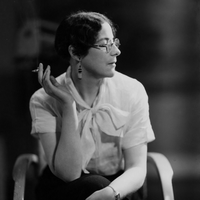Sylvia Townsend Warner
Sylvia Townsend Warner (6 December 1893– 1 May 1978) was an English novelist and poet. She also made a contribution to musicology as a young woman.
Sylvia Townsend Warner (6 December 1893– 1 May 1978) was an English novelist and poet. She also made a contribution to musicology as a young woman.
Life
Sylvia Nora Townsend Warner was born at Harrow on the Hill, Middlesex, the only child of George Townsend Warner and his wife Eleanor “Nora” Mary (née Hudleston). Her father was a house-master at Harrow School and was, for many years, associated with the prestigious Harrow History Prize which was renamed the Townsend Warner History Prize in his honour, after his death in 1916. As a child, Townsend Warner was home-schooled by her father. She enjoyed a seemingly idyllic childhood in rural Devonshire, but was strongly affected by her father’s death. She moved to London and worked in a munitions factory at the outbreak of World War I.
Warner was friendly with a number of the “Bright young things” of the 1920s. Her first major success was the novel Lolly Willowes. In 1923, she met T. F. Powys, whose writing influenced her own and whose work she in turn encouraged. It was at Powys’ home that Warner, in 1930, first met Valentine Ackland, a young poet; the two women fell in love and settled at Frome Vauchurch, Dorset. Alarmed by the growing threat of fascism, they were active in the Communist Party, and in 1937 visited Valencia and Benicàssim, in Spain, on behalf of the Red Cross during the Civil War. They lived together from 1930 until Ackland’s death in 1969. Ackland and Warner are buried together at St Nicholas, Chaldon Herring, Dorset. Warner’s political engagement continued for the rest of her life, even after she became disillusioned with communism.
Work
Early in her career Warner researched 15th and 16th century music. From 1917 she was in regular employment as one of the editors of Tudor Church Music, ten volumes published by Oxford University Press in the 1920s with the support of the Carnegie UK Trust. She obtained the work through the influence of her lover and music teacher Sir Percy Buck, who was on the editorial committee. The lead editor was initially Sir Richard Terry, who as the Master of Music at Westminster Cathedral, had been a pioneer in the revival of Tudor vocal repertoire.
Warner was involved in travelling to study source material and in transcribing the music into modern musical notation. Warner also published on the subject of musical notation including a contribution to the Oxford History of Music (in the introductory volume of 1929).
In 1934 she published a joint collection of poems with Ackland, Whether a Dove or a Seagull. She was encouraged to write fiction by David Garnett. Warner’s novels included Lolly Willowes (1926), Mr Fortune’s Maggot (1927), Summer Will Show (1936), and The Corner That Held Them (1948). Recurring themes are evident in a number of her works. These include a rejection of Christianity (in Mr Fortune’s Maggot, and in Lolly Willowes, where the protagonist becomes a witch); the position of women in patriarchal societies (Lolly Willowes, Summer Will Show, The Corner that Held Them); ambiguous sexuality, or bisexuality (Lolly Willowes, Mr Fortune’s Maggot, Summer Will Show); and lyrical descriptions of landscape. Mr Fortune’s Maggot, about a missionary in the Pacific Islands, has been described as a “satirical, anti-imperialist novel”. In Summer Will Show, the heroine, Sophia Willoughby, travels to Paris during the 1848 Revolution and falls in love with a woman.
Warner’s short stories include the collections A Moral Ending and Other Stories, The Salutation, More Joy in Heaven, The Cat’s Cradle Book, A Garland of Straw, The Museum of Cheats. Winter in the Air, A Spirit Rises, A Stranger with a Bag, The Innocent and the Guilty, and One Thing Leading to Another. Her final work was a series of linked short stories set in the supernatural Kingdoms of Elfin. Many of these stories were published in The New Yorker. In addition to fiction, Warner wrote anti-fascist articles for such leftist publications as Time and Tide and Left Review.
After the death of the novelist T. H. White, Warner was given access to his papers. She published a biography which The New York Times declared “a small masterpiece which may well be read long after the writings of its subject have been forgotten.” White’s long-time friend and literary agent, David Higham, however, questioned Warner’s work, suggesting a bias in her approach due to her own homosexuality: he gave Warner the address of one of White’s lovers “so that she could get in touch with someone so important in Tim’s story. But she never, the girl told me, took that step. So she was able to present Tim in such a light that a reviewer could call him a raging homosexual. Perhaps a heterosexual affair would have made her blush.”
Warner produced several books of poetry, including Opus 7, a book-length pastoral poem about an elderly female flower-seller.
Although Warner never wrote an autobiography, Scenes of Childhood was compiled after her death on 1 May 1978 at age 84, based on short reminiscences published over the years in the New Yorker. She also translated Contre Saint-Beuve by Marcel Proust from the original French into English. In the 1970s, she became known as a significant writer of feminist or lesbian sentiment, and her novels were among the earlier ones to be revived by Virago Press. Selected letters of Warner and Valentine Ackland have been published twice: Wendy Mulford edited a collection titled This Narrow Place in 1988, and ten years later Susanna Pinney published another selection, Jealousy in Connecticut.

